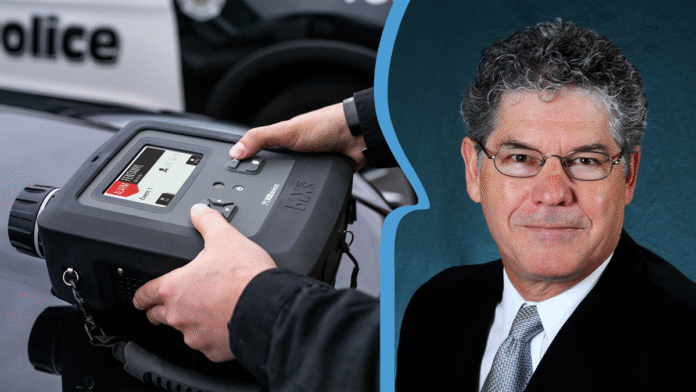Two decades ago at UNC-Chapel Hill, a chemist wondered: What if the most powerful chemical detection tool in the world — mass spectrometry — could be shrunk to fit in the palm of your hand? Today the answer is saving lives.
The MX908, a hand-held mass spectrometer developed by 908 Devices Inc., is now deployed across the United States to fight the fentanyl crisis and detect chemical threats at borders and in local communities. Its origin story began in the UNC College of Arts and Sciences’ chemistry department with J. Michael Ramsey, Minnie N. Goldby Distinguished Professor. The device reached its commercial realization under a small group of founders at 908 Devices, including Kevin Knopp, co-founder and CEO.
Ramsey, a National Academy of Engineering member, recalls the first inklings he had about shrinking mass spectrometry while at Oak Ridge National Laboratory in the mid-1990s. He and his students and postdocs began experimenting, and a happy accident opened the door to what would become high pressure mass spectrometry.
When Ramsey moved to UNC-Chapel Hill in 2004, he found a welcoming environment to develop the idea. “UNC was very supportive of spinouts,” he said. “It was easier to form a company here than at Oak Ridge.”
The commercial leap came when Ramsey reconnected with Knopp, a successful entrepreneur with whom he had collaborated previously on a National Institutes of Health project. In 2012, they launched 908 Devices, and Knopp took the reins as CEO. From the start, he said the Carolina connection was key.
“We looked at technologies from around the world. What we found in Mike’s lab at UNC was so unique, we built the company around it,” Knopp said. “Academic labs can tackle big ‘R’ research — proving the hard things — while companies like ours handle the big ‘D’ development. You need both.”
The MX908 can detect hundreds of analytes at trace levels including illicit drugs, such as fentanyl, explosives and other threats. Users place a swabbed sample under a lid, where it is heated and analyzed. Results appear in under a minute.
Nearly 3,000 of these mass spectrometers are now deployed in over 55 countries and used by agencies ranging from the Texas Department of Public Safety to U.S. Customs and Border Protection, and even Romanian customs.
In Texas, where fentanyl deaths surged 158% from 2020 to 2023, the device has become essential. “It provides a lab-grade answer in the field,” Knopp said. “Whether it’s a police officer, firefighter or mailroom worker, they need immediate, accurate results to make critical decisions.”
The 13-year partnership between 908 Devices and Carolina, including the University’s Office of Technology Commercialization, remains strong.
“Mike Ramsey combines world-class science with a genuine commitment to solving real-world problems, and he understands that commercialization requires engagement with business leaders beyond the University,” said Chance Rainwater, senior commercialization manager in OTC. “The 908 Devices team takes a collaborative approach with OTC to find solutions to issues related to UNC intellectual property rather than treating them as obstacles.”
The team’s mission is clear: Equip frontline workers with fast, reliable and robust chemical analysis tools. “The fentanyl crisis is a national emergency,” said Knopp. “But this extends to homeland and military threats, too. If fentanyl is aerosolized, it’s no longer just a drug problem. It’s a weapon.”
Knopp has a final message for Carolina students and faculty eyeing the entrepreneurial path. “Be passionate. Understand the customer. Think beyond the lab,” he said. “Even when you’re working on the fundamental science, always ask: Where could this go? Who could it help?”






